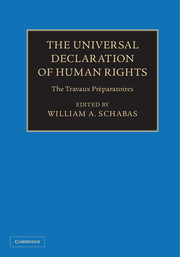Book contents
Introductory essay: the drafting and significance of the Universal Declaration of Human Rights
Published online by Cambridge University Press: 05 May 2013
Summary
The Universal Declaration of Human Rights was adopted by the United Nations General Assembly on 10 December 1948 following a complex drafting process that took nearly two years. Consisting of a preamble and thirty concise articles, totalling less than 1,800 words, the Declaration describes itself as “a common standard of achievement for all peoples and all nations”. It was designed to be part of a package comprising three components: a declaration or manifesto, a treaty or covenant, and provisions for implementation. The other parts followed the Declaration later, taking nearly two decades for adoption and another ten years for entry into force. The great impact of the Universal Declaration may not have been immediate. Its significance has grown over the years and continues to grow. The Declaration has been invoked in scores of international treaties, in national constitutions and legislation, and in judicial decisions at both the national and the international levels. In 2007, the United Nations Human Rights Council decided that all Member States would present periodic reports on their human rights compliance. Central to the legal framework of this new and novel procedure, known as Universal Periodic Review, are the standards set out in the Universal Declaration of Human Rights.
- Type
- Chapter
- Information
- The Universal Declaration of Human RightsThe Travaux Préparatoires, pp. lxxi - cxxviPublisher: Cambridge University PressPrint publication year: 2013



